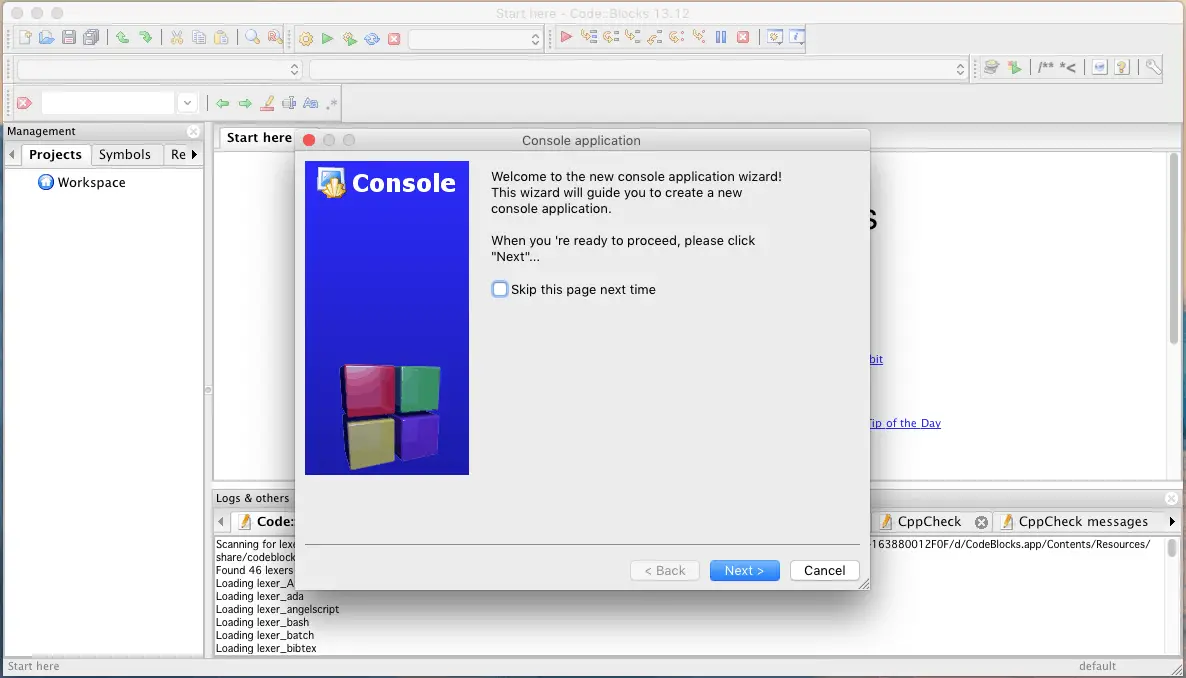Code Blocks C++ Mac
Hello Friends,In this tutorial, I will show you how to install and setup code blocks on mac os x Catalina to run C/C program. I have explained the whole pr. However, if you still wish to run CodeBlocks, you can either downgrade to Mojave or run Mojave on a separate volume. The latest Code blocks v16.01 is not available for Mac OS because, as the team behind the IDE put it, they don’t have developers to make one. So head on to codeblocks.org and download the version that is already available.
Take me over?
The maintainer of this distribution is looking for someone to take over! If you're interested then please contact them via email.
- The core instantiates the CMAC block along with the necessary GTH, GTY, or GTM transceivers. The core provides an example of how the two blocks are connected together, along with the reset and clocking for those blocks. The integrated block is designed to IEEE std 802.3-2012 Ref 2.
- If you have code that you’d like to reuse, Codesters allows you to store it inside a custom block. To create your own custom block, follow these directions: Step 1: Highlight the code in your editor you’d like to reuse and press CTRL - C (Windows) or CMD - C (Mac) to copy the text.
Digest::CMAC - The One-key CBC MAC message authentication code.
This module implements OMAC1 blockcipher-based message authentication code for perl. For OMAC1/OMAC. Check http://www.nuee.nagoya-u.ac.jp/labs/tiwata/omac/omac.html. Here is an excerpt of that page
OMAC is a blockcipher-based message authentication code designed and analyzed by me and Kaoru Kurosawa.
OMAC is a simple variant of the CBC MAC (Cipher Block Chaining Message Authentication Code). OMAC stands for One-Key CBC MAC.
OMAC allows and is secure for messages of any bit length (while the CBC MAC is only secure on messages of one fixed length, and the length must be a multiple of the block length). Also, the efficiency of OMAC is highly optimized. It is almost as efficient as the CBC MAC.
'NIST Special Publication 800-38B Recommendation for Block Cipher Modes of Operation: the CMAC Mode for Authentication' has been finalized on May 18, 2005. This Recommendation specifies CMAC, which is equivalent to OMAC (OMAC1).
Like many block-cipher's Crypt:: modules like Crypt::Rijndael, and MIME::Base64.
This creates a new Digest::CMAC object, using $key.
$cipher is 'Crypt::Rijndael'(default), 'Crypt::Misty1', Crypt::Blowfish', or whatever blockcipher you like. $key is fixed length string that blockcipher demands.
The $message provided as argument are appended to the message we calculate the MAC. The return value is the $cmac object itself;
This is just an alias for $cmac->new;
Code Blocks C++ Machines
Return the binary authentication code for the message. The returned string will be blockcipher's block size.
Same as $cmac->digest, but will return the digest in hexadecimal form.
Same as $omac1->digest, but will return the digest as a base64 encoded string.
Crypt::Rijndael, http://www.nuee.nagoya-u.ac.jp/labs/tiwata/omac/omac.html, http://www.csrc.nist.gov/publications/nistpubs/800-38B/SP_800-38B.pdf
OMAC designed and analyzed by Tetsu Iwata and Kaoru Kurosawa
'Crypt::CMAC' was written by Hiroyuki OYAMA <oyama@module.jp>
OMAC2 support added by Yuval Kogman
Codeblocks C++ For Mac
Copyright (C) 2006 by Hiroyuki OYAMA, 2007 by Hiroyuki OYAMA, Yuval Kogman
This library is free software; you can redistribute it and/or modify it under the same terms as Perl itself, either Perl version 5.8.6 or, at your option, any later version of Perl 5 you may have available.
1 POD Error
Code Blocks C++ Machine
The following errors were encountered while parsing the POD:
=back doesn't take any parameters, but you said =back 4
To install Digest::CMAC, copy and paste the appropriate command in to your terminal.
For more information on module installation, please visit the detailed CPAN module installation guide.
